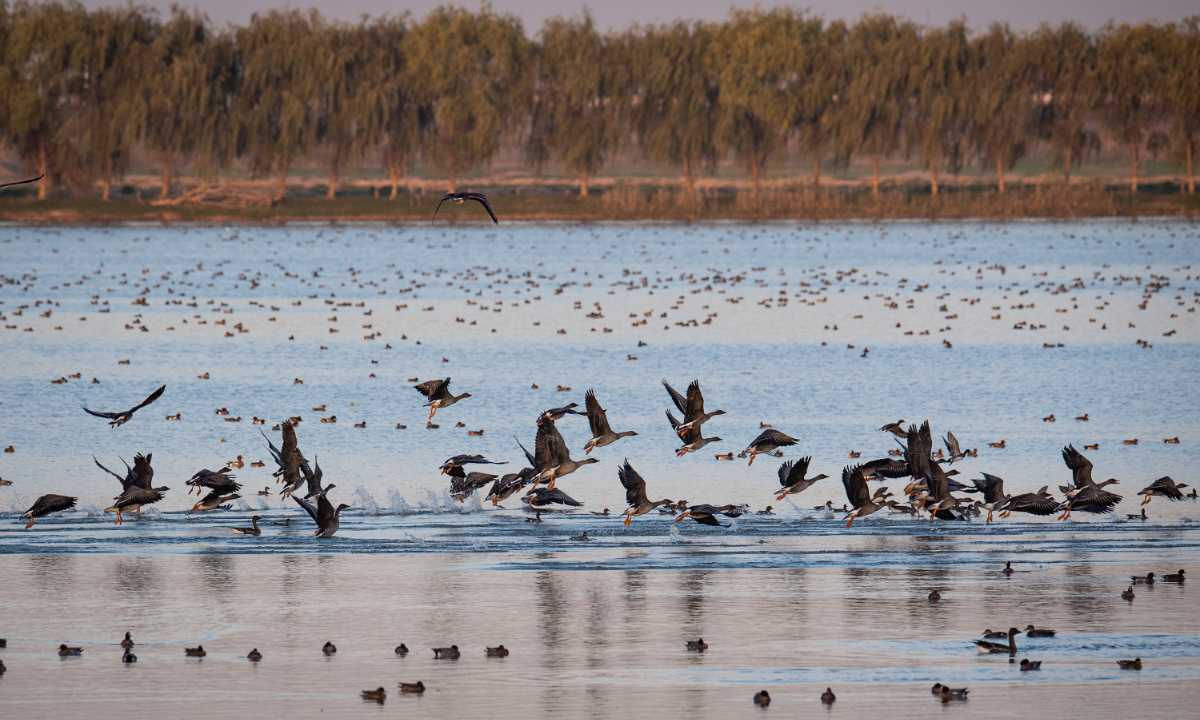
Lu Lunyan, chief representative of World Wide Fund for Nature Beijing Office (WWF China). Courtesy of Lu
As a key participant and leading contributor to wetland conservation, China's wisdom on wetland protection has been widely recognized and praised by the international community, Lu Lunyan, chief representative of World Wide Fund for Nature Beijing Office (WWF China), told the Global Times at the 14th Meeting of the Conference of the Contracting Parties to the Ramsar Convention on Wetlands (COP14), which was held in Central China's Wuhan and Switzerland's Geneva from November 5 to 13.
This year marks the 30th anniversary of China's accession to the Ramsar Convention. China leads the world in having the most international wetland cities, being home to 13 among all 43 cities globally. With 4 percent of the world's wetlands, China meets the ecological, productional, living and cultural needs of one-fifth of the world's population.
Over the three decades, WWF, as one of the key strategic partners under the Convention, has witnessed and participated in the actions taken by the Chinese government to address the global challenges of wetland area reduction and ecological degradation, Lu said in an exclusive interview with the Global Times.
China's wisdom and successful stories have been widely recognized and praised by the international community, such as advancing legislation to protect the wetland conservations, constant investment in raising public awareness, and China's expanding dialogue with other countries, Lu noted.

Northern migratory birds come to the Fuhe Wetland in Dongxihu district, Wuhan, Central China's Hubei Province for the winter. Photo: IC
Wuhan has become the first international wetland city in the world to host the meeting of the contracting parties to the Ramsar Convention, which demonstrates global recognition for Wuhan's practice, some delegates at the COP14 told the Global Times.
Since joining Ramsar Convention in 1992, Chinese people have had a dramatic shift in the perception of wetland conservation - from seeing wetlands as abandoned land to regarding it as an important part of the earth's ecosystem, according to Lu.
Scientific research solutions in wetland protection were relatively weak at the beginning in China. But now, protective works have been much more improved and efficient thanks to classified management system and smart detection technologies.
During a visit to Wuhan's flagship wetland park - the Wuhan East Lake National Wetland Park - Global Times reporters were impressed by the smart digital platforms monitoring species and climate indicators adopted by the park which can quickly and accurately capture the updates of the ecological environment.
Lu told the Global Times that WWF has long been committed to working with China in wetland conservation. In 2007, WWF, working with China's provincial forestry departments, established the Yangtze Basin Protected Area Network (YBPAN), a rare innovation worldwide and comprehensive network covering the entire basin. The network also launched an international training center, attracting global experts to come for a field research and exchange effective measures.
A report given by WWF shows that the extensive wetlands of the central, lower and estuary Yangtze are critical to the functioning of the whole Yangtze ecosystem, which in turn provides essential services to the hundreds of millions of people that live within the basin (for example, the regulation of water quality, fish production and flood control). These same wetlands also support a high concentration of rare and endemic species, including Chinese or Yangtze alligator and Yangtze finless porpoise, and provide the wintering grounds for over one million waterbirds of more than 100 species.
"As a 'City of Wetlands,' Wuhan has an extraordinary biodiversity, and the best indicator of local water health is the diversity of species in the water," Lu claimed.
After China raced to rescue the rare Yangtze finless porpoises when it was nearing extinction, more Yangtze finless porpoises, the critically endangered freshwater dolphin species endemic to China's longest river Yangtze, were observed during the latest scientific survey in October. Their activity areas were also found to be larger, with many first seen in some river sections.
The Yangtze finless porpoise is called the "smiling angel" in China for its mouth fixed in a permanent grin. After its better-known cousin, the baiji dolphin, was declared "functionally extinct" in the same waters in 2007, experts believe the finless porpoise is the Yangtze's last surviving mammal.
"More gratifying, volunteers and citizens in Wuhan have actively invested in and supported the conservation of finless porpoises, ramping up the efforts to save biodiversity," Lu said.
Wuhan, home to 165 rivers and 166 lakes, and with about 162,000 hectares of wetlands, ranks among the top three inland cities worldwide in wetland resources.
China's hosting of important global events on environmental protection over recent years, such as COP14 and COP 15 (the 15th meeting of the Conference of the Parties to the Convention on Biological Diversity) in Kunming in 2021, has significantly raised public awareness of ecological protection and sustainable development, said Lu. "During the visit in Wuhan, I can truly feel the public's love and enthusiasm for nature and support for green development."
China is steadily improving its wetland protection measures in terms of quantity, quality, and funds. China also sends its wise solutions to more countries. China has enacted the Wetlands Conservation Law in June, and more than 50 percent of China's wetland areas are under protection by 2020. These are remarkable achievements, Lu stressed.
By 2025, 50 new wetlands of national importance will be established, and the national wetland protection rate will reach 55 percent, according to the National Wetland Protection Plan (2022-30) announced in October.
Over the past decade, China has made headway in environmental protection, successfully controlling air pollution and curbing the worsening trend of water contamination. While making all-out efforts to tackle domestic pollution, China has long been a crucial contributor in the global environmental governance, fulfilling its responsibility as a great power to addressing global challenges, Lu said.





